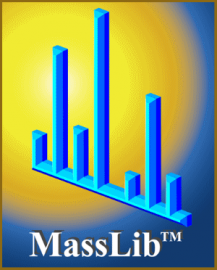MassLib™ version 9.4 includes many functional and operational enhancements. Special care has been taken to make this version even more consistent and user friendly for daily mass spec work.
Data import has been extended to include new data formats and enhanced for various pre-existing formats, particularly for data from Agilent, Bruker, Shimadzu, Thermo, and Waters instruments. Improvements have been made for importing more spectra, more types of data, accurate m/z, larger range of intensities, and for scan filtering, automatic application of a retention index table, and header information handling. A new function has been added for quick recalibration of the retention index table. The functions to compare two analyses have been enhanced.
Generally the information flow from analysis to libraries has been made more consistent and the information is better visualized. The “Show spectrum infos” tool shows all the additional information available for a spectrum.
Various improvements were made for searching spectra, structures and data, and for displaying hitlists. In particular the Neutral Loss search has been reworked substantially.
Isotopically labelled formulas are now supported for libraries and searches.
Saving spectra to user libraries is facilitated by improved field mappings. The library maintenance functions have been reworked. Support for commercial libraries has been extended to include e.g. NIST14 and Wiley Registry 10th Edition.
The Elemental Composition tool has been further advanced for both single accurate m/z as well as patterns.
The MassLib™ Structure Editor has been reworked considerably. The synchronization between the Structure Editor and the main program, and the display of structures have been improved. The editor is now much easier to configure using defaults, and the handling of attributes is much faster using the added push buttons. The editor has received various new functions and improvements, notably for resizing, rotating and aligning structures. The drawing, copying and printing of all structure drawing items has been improved and optimized for Windows 7/8.x and Windows Server.
Handling of title, header, text, structures and pages in the Report tool have been refined. The quality of the output to printer and PDF format has been further improved.
The current MassLib™ version 9.4 supports Windows 7 / 8 / 8.1 / Server 2008/2012 32/64bit, and includes significant improvements for multiuser environments.
For MassLib™ the following libraries are currently available:
• NIST’14 Library, 276,000 EI and 234,000 MS/MS spectra with structure plots (New)
• Wiley Registry 10th Ed., 719,000 spectra, 684,000 covered by structure plots
• Organic Compounds Library 2004, 37,000 Spectra with Structures (Yarkov)
• Muelheim Library 2006, 18,900 Spectra with Structures (mostly natural substances)
• Designer Drugs Library 2014, 20,000 Spectra with Structures (Rösner)
• Drugs & Poisons Library 2011, 8,500 Spectra with Structures (Maurer et al.)
• Physiologically Active Substances Library 2011, 4,100 Spectra w. Structures (Parr et al.)
• Drugs & Poisons LC Library 2014, 10,000 Spectra, 6,000 Structures (Maurer et al.)
• Geochemical Library 2003, 1,100 Spectra with Structures (NIOZ/TU Delft)
• Pesticides Library 2009, 1,200 Spectra, with Structures (Kühnle)
• Pesticides with Ret.Ind. Library 2011, 900 Spectra, with Retention Indices (Mondello)
• FAMEs Library 2011, 240 Spectra with Structures (Mondello)
• Flavors and Fragrances Library 2011, 3,000 Spectra with Structures (Mondello)
• Volatiles in Food Library 2003, 1,600 Spectra with Structures (TNO)
MassLib™ is a comprehensive software package for the processing and interpretation of single mass spectra and series of mass spectra, e.g. from GC-MS experiments.
Mass spectral libraries, commercial or user-built, can be used in searching for
• identical spectra
• structurally related similarities in spectra
• similar neutral loss spectra
• identical or similar structures and structural features
• chemical names, molecular weight, formulas or other data
The search results are presented in a hitlist, as one chooses with chemical names, structures or reference spectra with structures.
For questions please contact MSP at MassLib@msp.ch or via telephone +41 31 972 31 52
